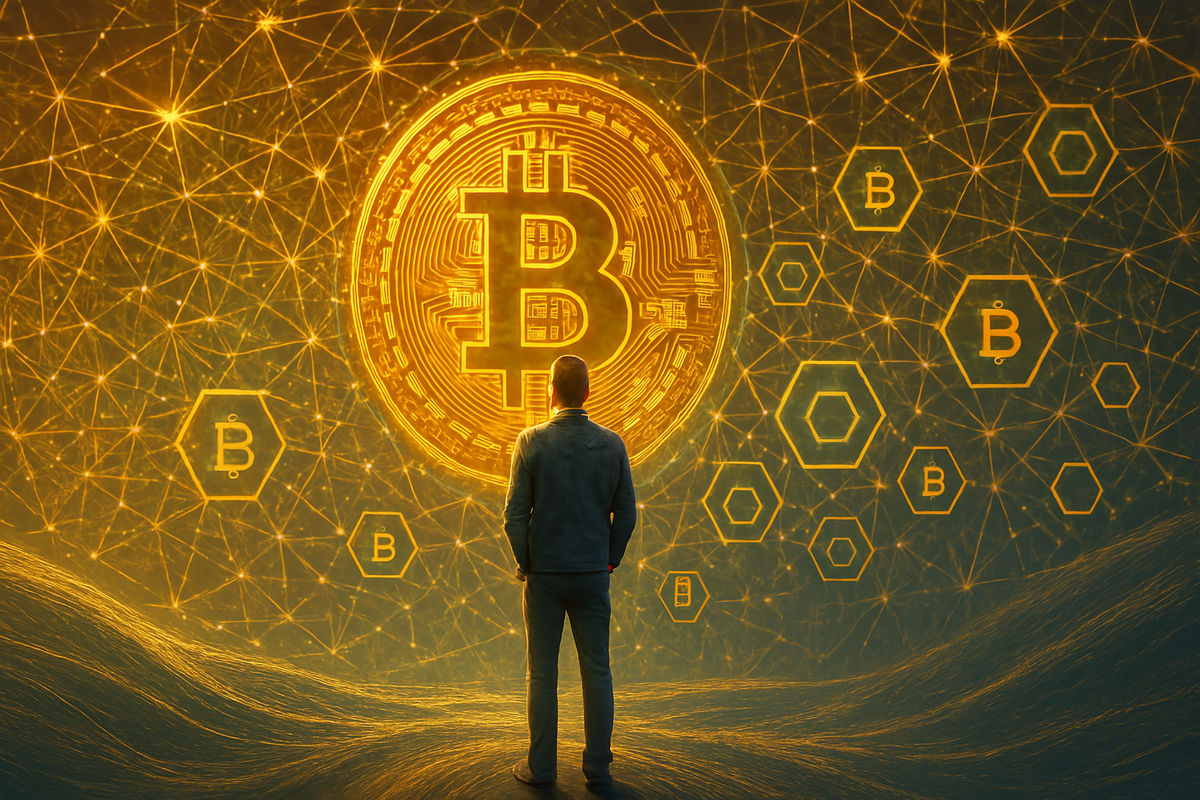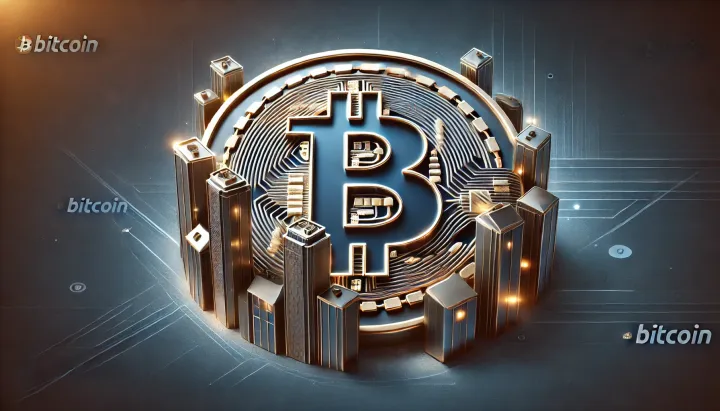Bitcoin: Gateway to Transformative Consciousness
The April 15, 2025 episode of The Bitcoin Edge with Paula featuring Matt Manning explores Bitcoin as a catalyst for personal transformation and systemic economic change.

- My 'briefing notes' summarize the content of podcast episodes; they do not reflect my own views.
- They contain (1) a summary of podcast content, (2) potential information gaps, and (3) some speculative views on wider Bitcoin implications.
- Pay attention to broadcast dates (I often summarize older episodes)
- Some episodes I summarize may be sponsored: don't trust, verify, if the information you are looking for is to be used for decision-making.
Summary
The April 15, 2025 episode of The Bitcoin Edge with Paula featuring Matt Manning explores Bitcoin as a catalyst for personal transformation and systemic economic change. The discussion connects shifts in individual consciousness with broader implications for a fiat-to-Bitcoin transition. Manning’s insights suggest that embracing Bitcoin can lead to more sustainable, value-driven societal structures.
Take-Home Messages
- Financial and Spiritual Integration: Manning emphasizes that Bitcoin challenges traditional views on money and personal identity.
- Systemic Overhaul: Transitioning to a Bitcoin standard necessitates rethinking current fiat-based economic frameworks.
- Volatility as Growth: The inherent volatility of Bitcoin markets mirrors the complexities of personal and societal evolution.
- Technological Synergy: Incorporating AI can enhance both Bitcoin’s operational efficiency and its role in promoting self-awareness.
- Conscious Economic Transition: A shift to Bitcoin offers an opportunity to move from scarcity to abundance by aligning financial practices with higher states of consciousness.
Overview
Matt Manning outlines his journey from a high-paying corporate career to a life defined by deeper personal values inspired by Bitcoin. He explains how Bitcoin triggered a re-evaluation of his understanding of money and identity, prompting a shift toward greater self-awareness. His narrative connects financial transformation with an inner awakening that challenges established economic norms.
Manning argues that Bitcoin has the capacity to free individuals from the constraints of the fiat system, enabling them to prioritize personal growth. He draws parallels between market volatility and the natural fluctuations in one’s journey toward higher consciousness. His reflections stress that both personal and economic realms require continuous adaptation to evolve.
The discussion also highlights the significant challenges of transitioning from a fiat-based system to a Bitcoin standard. Manning examines the structural and policy complexities inherent in such a systemic shift. Their dialogue reveals that overcoming these obstacles is crucial for realizing a decentralized, abundance-based economic model.
The integration of emerging technologies such as AI is seen as a pivotal factor in strengthening Bitcoin’s transformative potential. Manning suggests that this technological synergy will promote efficiency while deepening personal and collective insight. The episode ultimately advocates for a broader, conscious evolution that aligns financial practices with values of sustainability and well-being.
Stakeholder Perspectives
- Individual Bitcoin enthusiasts: Embrace Bitcoin as a means for personal empowerment and holistic financial reform.
- Traditional financial institutions: Likely express caution over the disruption of long-standing fiat economic models.
- Policymakers: Face challenges in creating regulatory frameworks that accommodate a shift toward a Bitcoin standard while ensuring stability.
- Technologists and AI innovators: See potential in leveraging AI to enhance Bitcoin’s operational resilience and promote self-awareness.
- Spiritual and holistic communities: Value the integration of personal growth with financial transformation as a path to deeper societal fulfillment.
Implications and Future Outlook
The episode implies that transitioning from a fiat-based system to Bitcoin will involve overcoming significant structural and regulatory hurdles. This shift promises a gradual realignment of economic paradigms, where financial practices become more aligned with long-term, value-driven goals. Key stakeholders must prepare for a disruptive period of adaptation as traditional systems give way to decentralized models.
Manning’s insights suggest that Bitcoin’s ability to catalyze personal transformation could drive a broader societal shift toward sustainable, conscious economic practices. By fostering an environment where individuals reassess their priorities, Bitcoin may encourage reduced time preference and deeper communal bonds. Such changes could gradually reshape educational, political, and social institutions to reflect more holistic values.
Emerging technologies like AI are positioned to accelerate these changes by providing new tools for enhancing both economic efficiency and personal insight. The integration of AI with Bitcoin is expected to support a more transparent and decentralized financial ecosystem. Future research and policy efforts will be essential in guiding this evolution to balance innovation with stability.
Some Key Information Gaps
- What structural challenges must be overcome to transition from a fiat-based system to a Bitcoin standard? This question is critical because it addresses the practical and policy-related barriers that could impede a systemic transformation. Clarifying these challenges can inform strategies for facilitating a smoother transition and aligning economic incentives.
- How does the existing fiat system constrain individual financial freedom in contrast to a Bitcoin standard? This question is essential as it probes the underlying limitations of fiat systems that contribute to economic inequities. Understanding these constraints is vital for leveraging Bitcoin to promote autonomy and long-term societal prosperity.
- What indicators best measure readiness for a systemic shift from fiat to Bitcoin? This inquiry is important because it emphasizes the need for objective benchmarks to gauge economic stability and societal preparedness. Such indicators can guide policymakers and researchers in monitoring progress and adjusting strategies during the transition.
- How can AI tools be optimized to support personal growth within the Bitcoin ecosystem? This question is significant due to the emerging role of AI in enhancing self-awareness and operational efficiency within the Bitcoin community. Optimizing AI integration could unlock new dimensions of personal and economic development, benefitting a wide range of stakeholders.
- How does the Bitcoin journey influence the evolution of personal ego and consciousness? This inquiry targets the transformative aspect of Bitcoin adoption, linking financial decisions to deep personal growth. Addressing this question can illuminate pathways for achieving higher consciousness and reducing ego-driven behaviors that may hinder collective progress.
Broader Implications for Bitcoin
Economic Realignment
The conversation suggests that the widespread adoption of Bitcoin may challenge existing global monetary hierarchies. As nations and financial institutions confront the limitations of the fiat system, a shift toward decentralized value could democratize economic power. This realignment holds the potential to redistribute financial influence more equitably on an international scale.
Cultural Evolution
Manning’s narrative indicates that Bitcoin could serve as a trigger for broader cultural shifts towards more sustainable and inclusive social practices. By encouraging individuals to rethink their values and time priorities, Bitcoin may promote a culture that prizes long-term growth over instant gratification. Such an evolution could foster stronger community bonds and a more resilient social fabric.
Technological Convergence
The integration of AI with Bitcoin underscores the potential for a transformative synergy between technological innovation and financial systems. This convergence is likely to drive new efficiencies and enhance transparency across decentralized networks. In the long term, the combined impact of these advancements could redefine how data, value, and human insight are integrated into global economic structures.



Comments ()